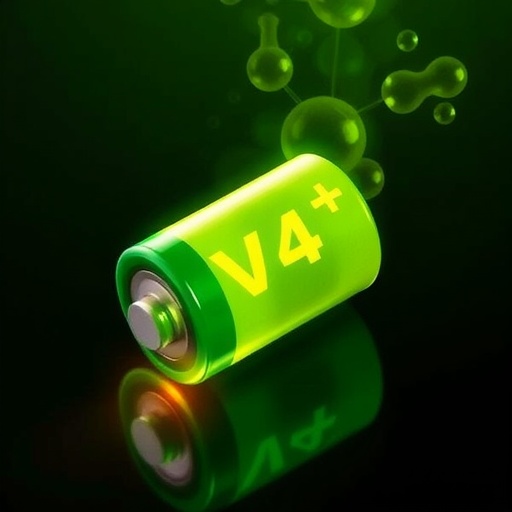In a groundbreaking development, researchers have uncovered a transformative approach to enhance the performance of zinc-ion batteries through the stabilization of vanadium ions. The study, spearheaded by Liu, J., Lv, S., and Xiao, M., delves into the intricacies of vanadium’s role in energy storage and introduces a novel methodology employing organophosphonate-modified electrolytes. The core of this research indicates a promising pathway toward achieving higher capacities in zinc-ion batteries, which are widely recognized for their potential in sustainable energy storage solutions.
Zinc-ion batteries present a compelling alternative to conventional lithium-ion systems, primarily due to their abundant availability and inherent safety. However, the challenge has always been their comparatively lower energy density and cycle stability. By harnessing the unique properties of vanadium, specifically vanadium in its +4 oxidation state, the study aspires to resolve these longstanding limitations. The integration of organophosphonates serves as a pivotal modification, ultimately aiming to create a more stable electrolyte environment that empowers vanadium ions to function optimally within the battery architecture.
The researchers meticulously investigated the interactions between the modified organophosphonate molecules and the vanadium ions within the electrolyte solution. This investigation not only provided insights into the chemical stability and electrochemical behavior of the new compound but also highlighted unique physical characteristics that could contribute to enhanced charge/discharge cycles. The findings suggest that the modified electrolyte fosters a conducive environment for vanadium, effectively preventing undesirable reactions that often compromise battery performance.
Moreover, the study extensively details the electrochemical methodologies employed to evaluate the performance of the newly formulated zinc-ion batteries. Utilizing advanced characterization techniques, such as cyclic voltammetry and electrochemical impedance spectroscopy, the research team was able to discern the intricate dynamics at play within the modified systems. The data revealed a significant improvement in both the capacity and rate capability of the batteries, suggesting a tangible leap forward in zinc-ion battery technology.
One of the most exhilarating discoveries within the publication is the impressive retention of capacity over numerous charging cycles. This longevity in battery life is a crucial component that could influence the widespread adoption of zinc-ion batteries across various applications, from electric vehicles to grid energy storage. By sustaining performance over extended periods, these batteries could potentially challenge lithium-ion dominance in the market.
Furthermore, the research emphasizes the environmental implications of utilizing zinc-ion batteries. With rising concerns regarding the sustainability of lithium extraction and its environmental footprint, the advancement of zinc-ion technologies represents not only a technical breakthrough but also a step towards greener energy solutions. The abundant nature of zinc and its lower ecological impact underscores the significance of this research in the broader context of sustainable energy development.
The findings also touch upon the implications for future research, suggesting avenues where multiple avenues could be explored. As the researchers point out, additional studies are warranted to dissect the molecular interactions in greater detail. Understanding these nuances could pave the way for further enhancing the electrochemical performance and stability of zinc-ion batteries. Future endeavors could additionally focus on elucidating the long-term aging processes of these newly synthesized systems, ensuring their viability in practical applications.
In conclusion, the innovative work by Liu, J., Lv, S., and Xiao, M. signifies a potential turning point in the advancement of zinc-ion batteries, with their extensive research shedding light on the essential role of vanadium ions within this context. The stabilization achieved through organophosphonate modification is a promising pathway that not only enhances performance metrics but also aligns with the global call for sustainable energy solutions. As the energy landscape continues to evolve, the insights gained from this research will undoubtedly inspire further exploration into alternative battery technologies that prioritize efficiency and environmental sustainability.
This pioneering research is poised to captivate attention across both scientific and industrial sectors. As the transition to sustainable energy solutions accelerates, studies like this will play an essential role in redefining energy storage systems for the future. The ramifications of this work extend beyond mere academic interest; they speak to the very real need for cleaner, safer energy solutions in an increasingly energy-conscious world.
In summary, the stabilization of V⁴⁺ in VOPO₄ through organophosphonate-modified electrolytes represents a significant leap forward in the quest for high-capacity zinc-ion batteries. The work opens the door for enhanced efficiency, cycle stability, and a sustainable path forward, ensuring that energy storage technology continues to grow in capability and responsibility.
Subject of Research: Zinc-ion batteries and vanadium ion stabilization via organophosphonate-modified electrolytes.
Article Title: Stabilization of V⁴⁺ in VOPO₄ via organophosphonate-modified electrolyte for high-capacity zinc-ion batteries.
Article References: Liu, J., Lv, S., Xiao, M. et al. Stabilization of V⁴⁺ in VOPO₄ via organophosphonate-modified electrolyte for high-capacity zinc-ion batteries. Ionics (2025). https://doi.org/10.1007/s11581-025-06827-8
Image Credits: AI Generated
DOI: 04 November 2025
Keywords: Zinc-ion batteries, vanadium ions, organophosphonate-modified electrolyte, energy storage, sustainability.




